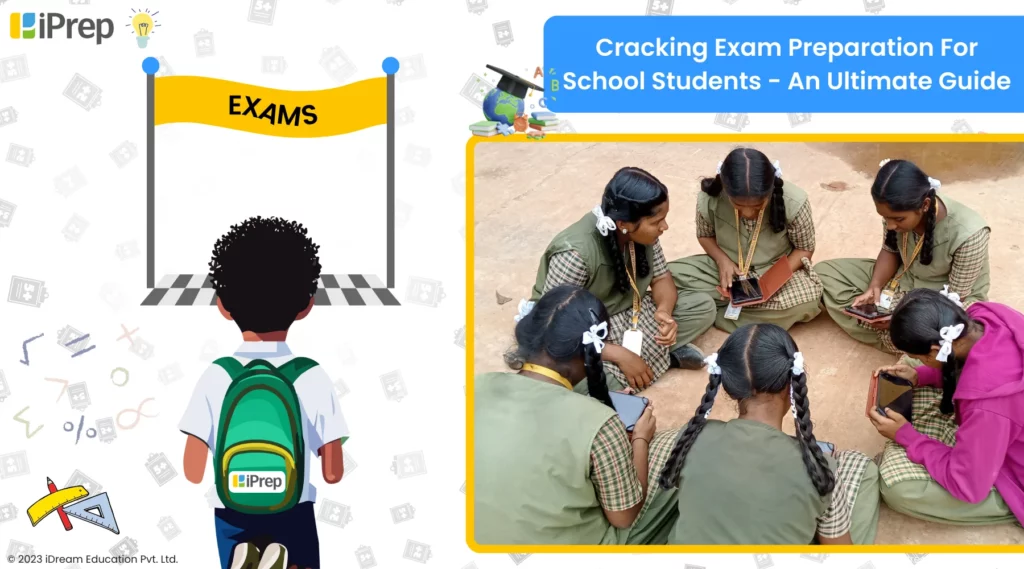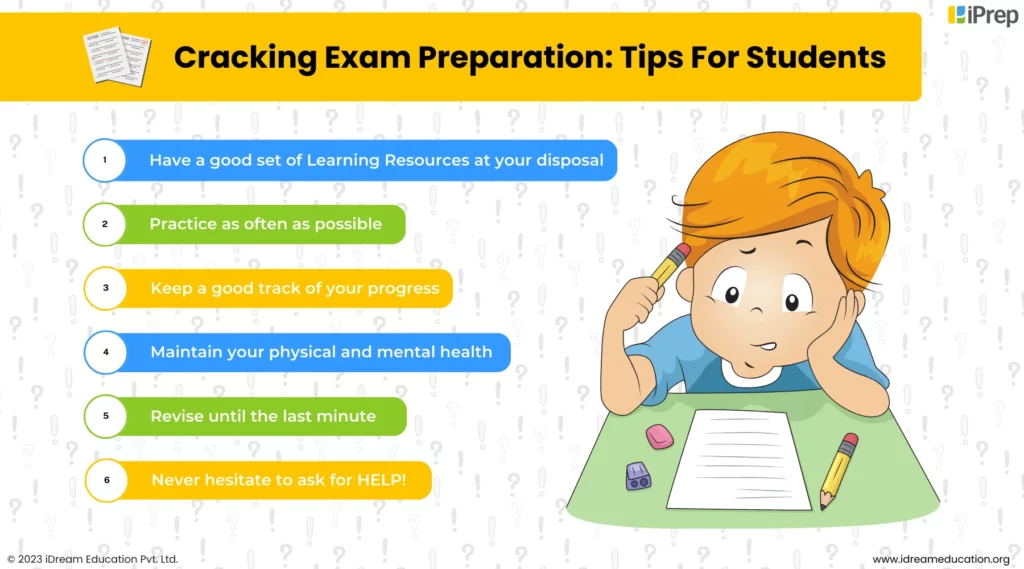Cracking Exam Preparation For School Students – An Ultimate Guide

“Exams”, is a term that is sure to bring extra consciousness to every school student’s mind. It’s not surprising, given that these times of exam preparation have long been a source of strain and worry in students’ lives. The time spent preparing for these important tests has consistently been marked by turmoil and disarray, a recurring pattern that has endured throughout the ages.
Exams’ importance cannot be emphasized. They are a critical point in a student’s academic journey since they assess their knowledge, understanding, and application of the subject matter. With this level of scrutiny comes an increase in pressure, which frequently leaves students feeling overwhelmed and nervous.
These tests, whether they are final exams, midterms, or even weekly quizzes, tend to take center stage in a student’s life. They serve as indicators of academic progress and competency, and the weight of expectations placed on them can be intimidating.
Exam preparation has been a maze of difficulties for most students throughout history. Sleepless nights, numerous notes, and a tornado of textbooks and study materials characterize the days coming up to the tests. It’s a season when time management is put to the test, and stress levels can skyrocket.
Even though that is the case, exams are an important part of the school curriculum. Let’s start this ultimate guide to Exam Preparation for school students by understanding the underlying importance of the concept of exams.
Why Are Exams Important For School Students
Exams allow students to demonstrate their knowledge and understanding of the course material. Keeping the ways exams are carried out in India into consideration, exams can be important in many ways-
1. Academic Achievement
Exam preparation is an undeniable pillar of school students’ academic success. It is the process by which students consolidate their knowledge of the subject matter and implement it in a structured manner. Preparation is directly proportional to enhanced exam performance, which frequently results in higher grades. This success not only enhances a student’s confidence but also opens the door to future opportunities such as college admissions and scholarships.
2. Time Management
The significance of time management in a student’s existence cannot be overstated. Exam preparation forces students to manage their time effectively, ensuring that they cover all required material without feeling hurried. Exams are not the only reason to learn how to construct a study schedule, adhere to it, and prioritize tasks. This is a lifelong skill. It is a valuable asset in one’s personal and professional life, assisting with organization and productivity.
3. Retention and Understanding
Reviewing and reconsidering the material learned throughout the academic year is required for exam preparation. This process not only assists students in consolidating their knowledge but also fosters a deeper comprehension of the topic. By reviewing key concepts, students are better able to connect the connections, which is vital for their long-term retention of the material. This exhaustive comprehension provides a solid basis for future learning and problem-solving.
4. Reduces Anxiety and Stress
Exam preparation can significantly reduce the anxiety and tension that frequently accompany examinations. Students feel more confident in their abilities when they are well-prepared, having covered the necessary material and practicing their skills. This assurance can serve as a formidable barrier against the apprehension that can negatively impact exam performance. Effective preparation involves not only what pupils know but also how they feel about that knowledge.
5. Self-Discipline
Exam preparation is an exercise in self-discipline par excellence. It requires students to adhere to a study schedule, avoid distractions, and maintain concentration on their objectives. In the long term, these characteristics become indispensable in numerous facets of existence. Self-discipline enables students to establish and attain personal and professional objectives, develop healthy habits, and surmount obstacles.
6. Recognizing Weaknesses
Identifying one’s limitations is a crucial aspect of exam preparation. Students identify areas in which they struggle or require additional clarification, enabling them to adapt their study efforts accordingly. This targeted approach not only adds efficiency to the exam preparation to help them excel in exams but also teaches them to acknowledge their weaknesses and actively work on self-improvement.
7. Improved Critical Thinking
Exam preparation frequently entails tackling difficult problems and queries that require critical thinking and problem-solving abilities. It encourages students to analyze data, synthesize concepts, and apply their knowledge to novel circumstances. These skills are essential for routine decision-making and addressing real-world challenges, they are not limited to exams or exam preparation.
8. Objective Setting
Exam preparation requires setting specific objectives, such as covering a certain quantity of material within a specified time frame or achieving a desired score. Developing the ability to establish and pursue such goals is a lifelong talent. In academics, careers, and personal growth, the capacity to define and pursue specific objectives is a defining characteristic of success.
9. Long-Term Learning
Exam preparation is not limited to stressing and forgetting the material afterward. It encourages lifelong learning. Students develop a solid foundation in their subjects by revising and reinforcing what they’ve learned. This foundation serves as a platform for advanced studies and a deeper comprehension of the surrounding world.
10. Competitive Advantage
Well-prepared students typically have a competitive advantage, whether it be on standardized tests, in college admissions, or for prospective job opportunities. High test scores can open the door to scholarships and prestigious educational institutions, while strong preparation and work ethic can impress prospective employers.
11. Personal Progress
The process of exam preparation contributes to personal development in addition to academic achievement. Students acquire organizational skills, tenacity, and self-assurance. They learn to effectively manage their time, surmount obstacles, and have confidence in their abilities. These qualities are essential for personal growth and are beneficial in all aspects of life.
12. Parental Participation
Exam preparation can be an opportunity for parents to engage meaningfully with their children. Parents can provide support, guidance, and encouragement during this period of development. This participation fosters a strong parent-child bond and reinforces the significance of education and family values.
13. Essential Life Skills
Research, note-taking, and effective study techniques, which are acquired during exam preparation, are highly transferable. They apply not only to academic pursuits but also to many facets of everyday life, such as problem-solving, information collecting, and self-directed learning. These competencies serve as a firm foundation for personal and professional development.
14. Evaluation of Progress
Exams are essential for measuring the development of students. They provide a snapshot of a student’s knowledge and skills at a specific time. This feedback enables students and teachers to identify areas that may need additional attention and support, thereby facilitating a more targeted approach to learning.
15. Planning for Future Obstacles
Exam preparation equips students with the skills necessary to overcome obstacles and difficulties. It teaches resiliency, adaptability, and performance under duress. These characteristics are not only valuable in academic contexts but also in future career challenges and life’s unforeseen obstacles.
All that brings us to the multifaceted importance of exam preparation for school students, emphasizing its far-reaching impact on their academic success and personal development. Now that we know why are exams important for students, let us get into some crucial steps in the form of tips for students to efficiently prepare for their exams.
Exam Preparation Tips For School Students

Tip 1. Have a good set of Learning Resources at your disposal
The very first step of being efficient in exam preparation for school students is having a good and comprehensive set of learning materials or resources at your disposal. These resources should include materials that can deliver in-depth coverage of the curriculum covering each chapter, topic, and subject and also a quick walkthrough of the same curriculum. That’s just like having both the syllabus books and quick guides or notes on all subjects, chapters, and topics.
It is essential to have a variety of study materials. Textbooks provide comprehensive information, whereas other resources such as notes, and reference materials offer alternative perspectives and concise summaries of topics. Possessing a comprehensive collection of resources enables you to approach your studies from a variety of perspectives, making it simpler to grasp difficult concepts.
This is exactly what you get in the iPrep Learning app. You have access to both syllabus books for in-depth coverage and comprehensive notes for each chapter for quick revisions. That way with iPrep you’ll be well-equipped to learn and register knowledge in multiple formats that you can choose from based on the time you have for exam preparation. That makes it a potential source to use for exam preparations by school students.
Tip 2. Practice as often as possible
Practice does more than familiarize you with the material. It also increases your confidence at the time of exam preparation. When you work through problems and practice queries, you develop problem-solving skills in addition to learning the material. Continuous practice ensures that you can effectively implement your knowledge on the exam.
With learning apps like iPrep, you get a comprehensive set of MCQ-based practice questions with instant feedback for all chapters within all subjects. These practice sets help you build masteries on all chapters by making you familiar with the types of questions that may occur in the exams. The instant feedback message gives you the logic behind the question, thus helping you understand the questions well.
Tip 3. Keep a good track of your progress
It is essential to create a study schedule and monitor your progress within the times of exam preparation. By establishing specific objectives and benchmarks, you can evaluate your accomplishments. Tracking your progress keeps you motivated and ensures you remain on track. If you observe that you are falling behind in certain areas, you can adjust your study schedule accordingly.
Some learning apps such as the iPrep App come with a real-time progress tracking system. It at every moment records the progress made by each student while using the app and then presents subject-wise and category-wise usage data within the My Reports section of the application. This data will help you keep a good track of your learning process, especially at times of exam preparation. By taking the help of the My Reports section, you can ensure that you do not miss out on any chapter within any subject from your grade. With this, you can ensure that you achieve 100% mastery of all subjects, thus preparing you even better for your exams.
Tip 4. Don’t rely on a single source of information; attempt multiple
Diversifying study resources has the potential to alter the game of exam preparation for school students. Various sources offer distinct insights and explanations. If one source does not clarify a concept, another may. This method not only improves your comprehension but also maintains your study sessions engaging and dynamic.
That way, if a syllabus book is not able to clarify the concept for you, try notes. If notes can do that too, try video lessons or even practice. Trying different kinds of learning content can create a better chance for you to find what fits your learning style and ability, thus creating a higher chance for you to understand and register knowledge.
With educational apps such as iPrep, you get access to all these kinds of learning content including joyful animated video lessons with real-life connected animations, practice with instant feedback, assessments, syllabus books, and notes for quick revision. That way you can choose and learn from the type of content that suits your style or can explore them all for an in-depth understanding of concepts.
Tip 5. Discover ways to make learning enjoyable
Incorporating creative techniques can make learning more enjoyable at the time of exam preparation. Use study material that not only makes it easy to understand complex concepts but also adds a stroke of joy to the learning progress. Just like the animated video lessons present on the iPrep Learning app.
These videos bring in real-life connected animations that not only make it easier for learners to understand complex topics but also add a much-needed stroke of joy to the learning process. Also, the MCQ-based practice sets make it easier for students to understand the type of questions they may joyfully face in exams. Thus, iPrep stands out as a significant tool for exam preparation for school students.
Tip 6. Consider adaptable options
Some subjects or topics may be especially difficult, and a one-size-fits-all approach may not be effective. Consider adaptive solutions such as adaptive learning software in such situations. These options can be tailored to your specific requirements, allowing you to overcome challenging subjects more effectively.
That’s more than similar to what you get with the iPrep PAL Application where PAL stands for Personalized Adaptive Learning. This application is designed to adapt to learners’ current learning levels and then create personalized learning paths for them to gradually achieve grade-level proficiency on each chapter and subject of their grade. Thus bringing in more efficiency in the process of exam preparation for school students.
Tip 7. Maintain your physical and mental health
Your physical and mental health has a substantial impact on your ability to study effectively. To maintain the vitality and concentration required for extended study sessions, adequate rest, a balanced diet, and regular exercise are crucial. Meditation and other techniques for stress management can help you remain tranquil and composed.
You can also give a try to the joyful set of holistic growth content present on the iPrep app. This includes a rich collection of books in the book library, interactive lessons, practical videos, audiobooks, and simulations. These will be a perfect fit for you to get over the stress that may come up in the times of exam preparation.
Tip 8. Revise until the last minute
Revision should not be left until the last minute. Regularly reviewing previously acquired information strengthens memory and improves retention. No matter how strongly you believe you have registered a concept, topic, chapter, or subject, you still shouldn’t stop revising as that can cause you not to recall the information you’ll need the most, i.e., at the time of exams. Spreading out your revision sessions throughout your study period or exam preparation period is more effective than cramming everything in at the last minute.
Use the comprehensive notes present on the iPrep Learning app for each chapter and subject from all classes to quickly revise whatever you learn throughout your academic year.
Tip 9. Avoid Overwhelming yourself
It is essential to maintain a balance between studying and enjoying breaks. Excessive study hours can contribute to exhaustion and a decline in productivity. Long-term viability is enhanced by a balanced approach that includes regular pauses and leisure activities.
For, your break time, as we already discussed you can give a try to the joyful set of holistic growth content present on the iPrep app. From interesting books to interactive lessons, to practice and simulations, it has everything to give you a decently joyful break from your exam preparation sprint.
Tip 10. Never hesitate to ask for HELP!
There is no shame in obtaining assistance when faced with difficulties. Asking for assistance is an indication of your dedication to academic success, whether it’s with your instructors, classmates, or academic advisors. Additionally, study groups are a valuable resource for discussing difficult topics and obtaining new perspectives.
Incorporating these additional guidelines into your exam preparation strategy will not only increase your likelihood of success but will also make the journey more manageable and enjoyable. Remember that the key to effective exam preparation is recognizing your learning style and adapting these strategies to your particular requirements and preferences.
Let’s Conclude
In summary, exam preparation for school students is a pivotal and multifaceted journey, offering benefits that extend beyond academic success. Exams serve as a cornerstone for academic achievement, instilling crucial skills such as time management, critical thinking, and self-discipline, while also nurturing deeper subject understanding and resilience in the face of stress. They pave the way for lifelong learning, personal growth, and a competitive edge in various aspects of life.
To excel in this endeavor, it’s essential to employ a diverse set of learning resources, engage in regular practice, track progress, embrace adaptable learning solutions, and prioritize physical and mental well-being. Seeking help when needed and finding joy in the learning process are equally important. By following these strategies, students can confidently navigate the path of exam preparation, ensuring not only success but also a fulfilling and enjoyable journey toward a bright future.







